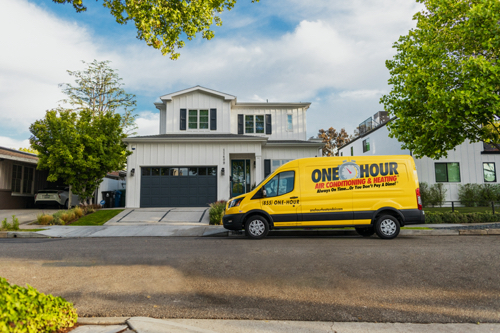
At startup and throughout each cooling cycle, your air conditioner requires more electricity than your electrical panel can supply. To make up for this deficit, it has run and start capacitors. These components harness and store electricity to meet your air conditioner’s energy demands. Without them, your cooling system might turn on, but it won’t have the ability to cool.
How AC Capacitors Work
Start capacitors send their stored energy to blower motors in small, measured jolts. This revs blower engines up and initiates the cooling cycle. Once air conditioners are running, run capacitors take over. Run capacitors provide a smaller but steady current until cooling cycles are complete.
How Long Do AC Capacitors Last?
AC capacitors are among the most frequently replaced parts in cooling systems. These components can last five to 20 years depending upon their quality, whether or not they’re properly installed, and their environmental conditions. In hot, humid areas, AC capacitors typically have shorter lifespans.
Dual Capacitors
Some air conditioners have dual capacitors instead of run and start capacitors. Dual capacitors perform both jobs. They deliver larger jolts of energy at startup and then dial their voltage down to power cooling cycles. With a dual capacitor, your air conditioner will have one less part to replace and maintain.
The Benefits of Upgrading to a Dual Capacitor
When one capacitor fails but the other continues functioning, it’s generally best to replace both at once. If you don’t, new capacitor problems could occur within just weeks or months.
When replacing your capacitors, One Hour Air Conditioning & Heating can replace both units with a dual capacitor. Although dual capacitors have a higher upfront cost, they’re less expensive than the combined cost of startup and run capacitors. They also take up less space and they’re easier to install. Making this upgrade could save you both time and money when replacing this component in the future.
Signs Your AC Capacitors Are Failing
Air conditioners with failing capacitors can take a long time to start up. In some instances, they won’t start at all. Other common signs of a failing AC capacitor include:
- Burning odors and thin smoke coming from the outdoor condenser
- Random shutdowns
- Rising energy bills
- Loud buzzing or humming sounds during AC operation
- Slower-than-normal fan speeds
If your start capacitor still works but your run capacitor is faulty, your air conditioner will cycle on but the air that comes from your vents will be tepid. Without functional run capacitors, AC compressors don’t have enough power to move refrigerant.
Failed and failing capacitors also look different from new ones. When brand-new, capacitors are shiny and cylindrical. They look similar to small soda cans with two leads at their end. As they break down, capacitors often swell and bulge. With extreme deterioration, they may even leak oil.
Can You Replace Your Own AC Capacitor?
AC capacitors are not batteries. Replacing them isn’t a simple, plug-and-play operation. As a do-it-yourself project, it’s extremely dangerous. Capacitors can remain electrically charged even after homeowners have turned their air conditioners off at their circuit breakers. Faulty capacitors can hold enough charge to cause significant bodily harm. If your air conditioner is still under its manufacturer’s warranty, tampering with this component can also result in the loss of your warranty.
Our technicians at One Hour Air Conditioning & Heating can safely remove your old capacitors and put new ones in. We stock high-quality replacement parts and install them to manufacturer specifications. We can also share needs-specific advice on extending the lifespan of this important component.